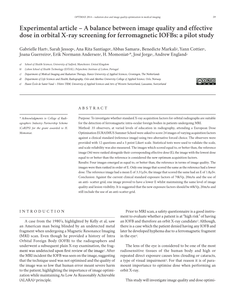Purpose: To investigate whether standard X-ray acquisition factors for orbital radiographs are suitable for the detection of ferromagnetic intra-ocular foreign bodies in patients undergoing MRI.Method: 35 observers, at varied levels of education in radiography, attending a European Dose Optimisation EURASMUS Summer School were asked to score 24 images of varying acquisition factors against a clinical standard (reference image) using two alternative forced choice. The observers were provided with 12 questions and a 5 point Likert scale. Statistical tests were used to validate the scale, and scale reliability was also measured. The images which scored equal to, or better than, the reference image (36) were ranked alongside their corresponding effective dose (E), the image with the lowest dose equal to or better than the reference is considered the new optimum acquisition factors.Results: Four images emerged as equal to, or better than, the reference in terms of image quality. The images were then ranked in order of E. Only one image that scored the same as the reference had a lower dose. The reference image had a mean E of 3.31μSv, the image that scored the same had an E of 1.8μSv.Conclusion: Against the current clinical standard exposure factors of 70kVp, 20mAs and the use of an anti- scatter grid, one image proved to have a lower E whilst maintaining the same level of image quality and lesion visibility. It is suggested that the new exposure factors should be 60kVp, 20mAs andstill include the use of an anti-scatter grid.
DOCUMENT

Patients scheduled for a magnetic resonance imaging (MRI) scan sometimes require screening for ferromagnetic Intra Orbital Foreign Bodies (IOFBs). To assess this, they are required to fill out a screening protocol questionnaire before their scan. If it is established that a patient is at high risk, radiographic imaging is necessary. This review examines literature to evaluate which imaging modality should be used to screen for IOFBs, considering that the eye is highly sensitive to ionising radiation and any dose should be minimised.Method: Several websites and books were searched for information, these were as follows: PubMed, Science Direct, Web of Knowledge and Google Scholar. The terms searched related to IOFB, Ionising radiation, Magnetic Resonance Imaging Safety, Image Quality, Effective Dose, Orbits and X-ray. Thirty five articles were found, several were rejected due to age or irrelevance; twenty eight were eventually accepted. Results: There are several imaging techniques that can be used. Some articles investigated the use of ultrasound for investigation of ferromagnetic IOFBs of the eye and others discussed using ComputedTomography (CT) and X-ray. Some gaps in the literature were identified, mainly that there are no articles which discuss the lowest effective dose while having adequate image quality for orbital imaging.Conclusion: X-ray is the best method to identify IOFBs. The only problem is that there is no research which highlights exposure factors that maintain sufficient image quality for viewing IOFBs and keep the effective dose to the eye As Low As Reasonably Achievable (ALARA).
DOCUMENT
